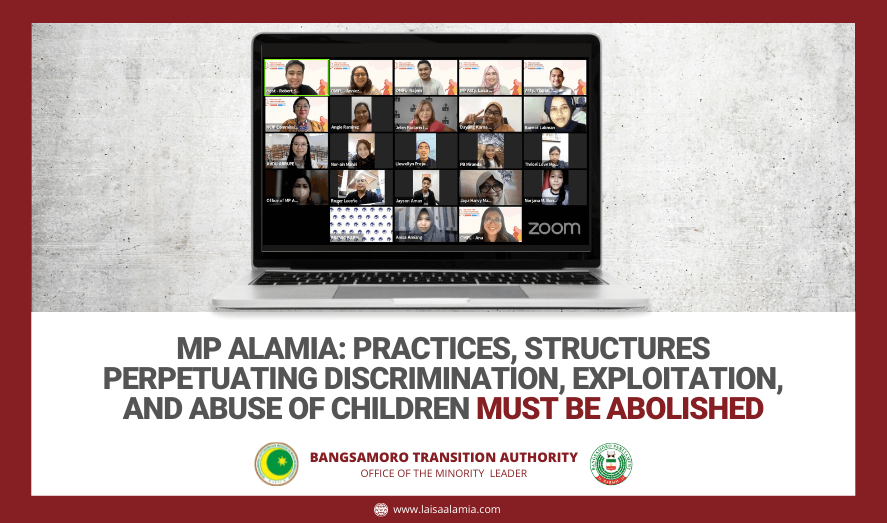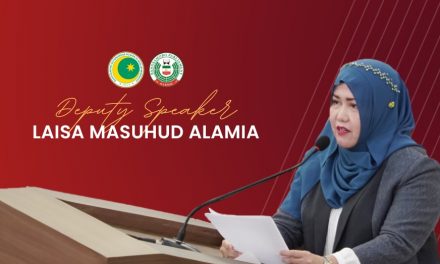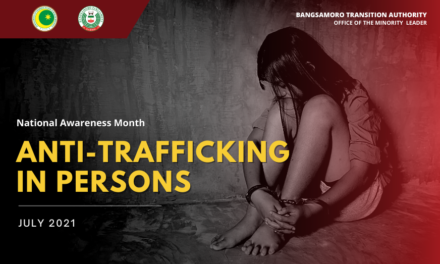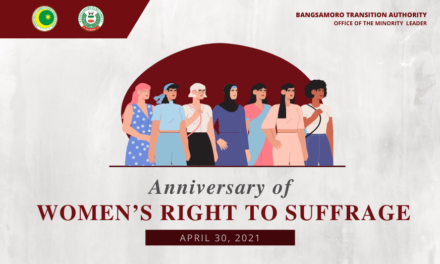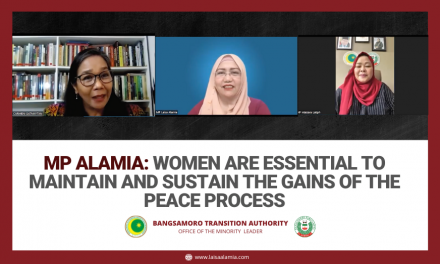Following the passage of Republic Act No. 11596 or the Prohibition of Child Marriage Law and its impending implementation across the country, the Office of Minority Floor Leader MP Atty. Laisa Alamia led a discussion of the law and child marriage via an online forum organized in partnership with the Kalisa Action Network (KalisaAN), a network of women’s groups and advocates that advance the rights and welfare of women and children in the Bangsamoro and Zamboanga Peninsula.
In her message, MP Alamia said that “the passage of the law was anchored on evidence that child marriage is a harmful practice. It perpetuates discrimination, abuse, and exploitation of children. It poses significant harm to minors, especially girls, and this is the main point of the law, backed by a plethora of evidence.”
“We need to abolish traditional and cultural practices and structures that perpetuate discrimination, exploitation, and abuse of children,” she said. “Child marriage has been declared as a form of child abuse, because it debases, degrades, and demeans the intrinsic worth and dignity of children.”
Among the resource speakers was Sen. Risa Hontiveros, chairperson of the Senate Committee on Women, Children, Family Relations and Gender Equality; and principal author and sponsor of Senate Bill No. 1373 or the “Girls Not Brides Act, which aims to promote the empowerment of women and girls by abolishing unequal structures and practices that perpetuate unjust practices against women and children.
Difficult conversations
“We have had to have many difficult conversations,” said Sen. Hontiveros during the event. “Many cultural norms have had to be questioned and reassessed. One major challenge in the passing of this measure was the mixed reception from some stakeholder groups, as the law goes against long-held cultural beliefs and practices.”
Sen. Hontiveros pointed out how communities have had to “learn and unlearn certain core beliefs” which are driven by “economic contingencies. She noted how incidents of child marriage “increase in areas suffering from persistent poverty, disasters, armed conflict, and other crisis situations.” Internally displaced families, she said, “are further driven into destitution, that many marry their daughters off to relatives or other individuals who they feel could better care for them.”
All this, she pointed out, are “supported by a patriarchal system,” especially since child marriage is part of social norms that are often the result of “entrenched gender inequality.”
In consultations with communities, Sen. Hontiveros said that they engaged in a conscious effort to introduce culturally-appropriate programs and services that will be responsive to the needs of those who will be affected by the measure. “It was not a comfortable process, but discomfort is needed for growth.”
“At the end of the day, at its heart, the law is simply protection for children, especially for girls,” she said.
Numerous drivers of child marriage in the BARMM
Ernesto Almocera, Jr., Communications and Advocacy Manager of Plan International Philippines, shared the results of a study they conducted to further understand the risks, drivers, and consequences of child marriage in BARMM, in partnership with the Women’s Refugee Commission, an NGO that aims to improve the lives and protects the rights of women, children, and youth displaced by conflict and crisis, and Transforming Fragilities, an NGO focusing on research, M&E, capability building, and organizational development.
He said that while the Philippines has passed several laws and policies to eliminate gender discrimination against women, address gender inequalities, and promote children’s rights, as is also committed and ratified several international agreements to eliminate child, early, and forced marriage, “the practice of child marriage continues to occur, especially among families experiencing extreme poverty and/or displacement due to humanitarian emergencies.”
Drivers of child marriage in the BARMM, he noted, are many. These include conflict or disaster related displacement, limited decision-making power among girls, a sense of self-sacrifice and duty to family among adolescent girls, controlling adolescent sexuality to protect family honor, poverty and lack of acces to stable income-generating activities, lack of access to quality education, differing interpretations of Islamic beliefs around child marriage, and a legal environment that enables child marriage due to numerous conflicting laws relating to child marriage.
Ways forward
“As the primary agency mandated to look after the welfare of Muslim Filipinos, the commission has created a committee on RA 11596 to formulate and execute a strategy to implement the said act.” said Hon. Dalisay “H. Alleya” N. Macadawan is Commissioner for the Women’s Sector in the National Commission for Muslim Filipinos (NCMF).
Relative to the implementation of the law, the NCMF “came up with an action plan in response to issues affecting the Muslim children, as well as a position paper submitted to the senate and other NCMF offices.” They also conducted a trainers’ training regarding RA 11596, as they await the approval of the action plan with funding for the implementation of programs and activities which include production of information and education materials, awareness campaigns and a caravan for the said law; a national Muslim stakeholders conference, women’s reproductive health and awareness program for madrasah and elementary students; young women leaders’ summit; regional and provincial women’s assembly with community leaders and LGU officials, etc.
Jennifer Pia Sibug-Las, Commissioner for Central Mindanao of the National Commission on Indigenous Peoples (NCIP), also shared the NCIP’s initiatives before and after the passage of RA 11596. This includes an “effective and efficient information dissemination campaign to avoid detrimental and irreversible effects to the indigenous communities.”
The campaign involves the regional, provincial, and other field offices, alongside the regular information and education campaigns on the Indigenous Peoples Rights Act (IPRA) and other laws, conducted regularly by NCIP Legal Officers and Regional Hearing Officers as part of NCIP’s Paralegal Training Program. The NCIP has also touched base with the Department of Social Welfare and Development, the lead agency in the implementation of the Act, regarding the Implementing Rules and Regulation for RA 11596.
MP Hadja Bainon Karon, chairperson of the Bangsamoro Women Commission (BWC), was represented by Ustadz Abdulsalam Alabat, religious guidance adviser of the commission. To discourage early marriage, recommendations to create mechanisms for pre-marriage counseling has been taken up with the Regional Darul Ifta. This has also been integrated into the regional Gender and Development Code.
Under Karon’s leadership, the BWC has been implementing the Bangsamoro Regional Action Plan on Women, Peace and Security (WPS), and has recently launched a fatwa that addresses five forms of gender-based violence. The Commission has also been tirelessly working to end child marriages and eliminate gender based-violence (GBV) in the region.

